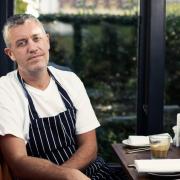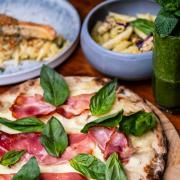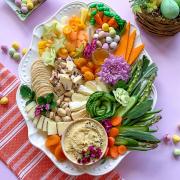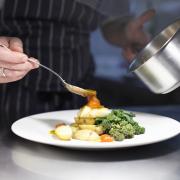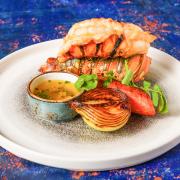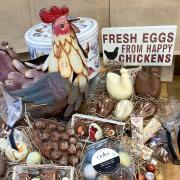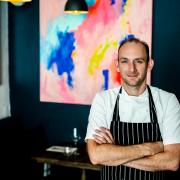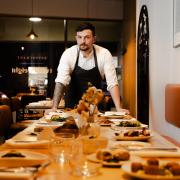When everything stopped, they didn’t. And there’s never been a more important time to support our farmers

“Local people want local produce. They crave it.”
Groobox’s David Fryer might just be right. In his own words, orders to his veg box farm (Groobarbs Wild Farm, in Knutsford) during lockdown “have gone ballistic”. All of a sudden, old customers were coming back and existing customers started to recommend the scheme on social media pages to friends, strangers and locals.
It was only seven years ago that David started the one-man business, putting together 10 veg boxes every Friday night in his garage.
“Farmers back in the ’80s and ’90s would take their produce on horse and cart to the local village and deliver it to homes,” David says. “I thought: that is exactly what I’m going to do on my farm. Next-door farmers were telling me I was crazy, but I thought it was crazy just to be doing the same old stuff. We needed something new.”
Now the 10-acre (soon to be 45-acre) veg business is booming, with lockdown having helped push it that one step further. Groobarbs has bumped its staff numbers from eight workers pre-lockdown to around 30 now, with most staff working 30 to 35 hours a week.

David says: “About a week before lockdown I noticed the mood was changing. From June 2019 to early February this year, I’d been attending local markets to sign people up to the veg box, but it was getting harder and harder because no-one seemed bothered about cooking.
“The message was, ‘we don’t cook anymore’. So things were difficult. But then in a weekend we had 30 old customers come back to us. That had never happened before.”
David hired local people and students as quickly as possible, with one great example being three brothers from Lymm. They finished school on the Friday, and by the Monday they were in full-time work.
“They’re here picking spring onions as I speak,” says David, who is also looking on a field of lettuce, pumpkins, squash, courgettes, potatoes, carrots, beetroot, cauliflower, cabbages and kale. “People started posting on social media asking where they could get a food delivery, and it was our existing customers that promoted us, saying people should buy our veg boxes. That was so powerful. I haven’t experienced this ever before, but everyone’s attention suddenly turned to food and how to get it. It became a priority.”
It’s been the same kind of story for Holmes Chapel dairy farmer and third generation of Bidlea Dairy, Adam Brown. “As bad as it sounds, lockdown has really done us good,” he says. Before coronavirus hit, the dairy was busy, but it wasn’t doing the volumes they wanted.

“And then all of a sudden it went bloomin’ crazy,” Adam says. “It’s still up there now – we’re just as busy, if not busier.”
Bidlea Dairy is producing five times as much milk now as it was pre-lockdown, offering doorstop deliveries and supplying farm shops, garden centres, post offices and petrol stations, as well pubs, cafés and restaurants that have picked up where they left off.
Bidlea is the herd prefix for the almost 1,000 free-range, pedigree Holstein Friesians the family has raised for more than 40 years.
“I used to have to go out on the roads trying to sell, but now we’re getting phone calls asking us to introduce ourselves,” Adam says. “We’re getting new customers all the time. It’s giving us a real buzz.”
This local feel is what Bidlea Dairy’s customers are embracing, too – they like to see where their milk is coming from through the viewing gallery at the dairy. It tastes better, it’s traceable and they can serve themselves via the farm vending machine. And customers who have a long commute or fancy an early morning buzz, can stop off at the milk dispenser to top up their black coffee with fresh whole milk straight from the farm.

They can also pick up flavoured milks, cream and butter, as well as Hilly Billy Ice Cream, made by Blaze Farm in the Peak District using Bidlea milk.
“We’ve only been up and running 12 months but I think people appreciate what we’ve done for them through lockdown when the supermarkets couldn’t stack the shelves quick enough,” Adam says. “We’re open from seven in the morning to 10 o’clock at night. It’s local, it feels safe – it was processed this morning and it’ll be in your fridge later today. We’re just trying to gauge what the customers want and keep them happy.”
Keeping customers happy is the ticket for Macclesfield’s The Cheshire Cheese Company, which has seen a similar success story through lockdown.
Consumer knowledge expert Kantar Worldpanel says spending on cheese in the 12 weeks to June 14th hit £837 million – a 23.4 per cent rise in value – and for The Cheshire Cheese Company, online sales surged 240 per cent like-for-like compared to the previous year, with the business exceeding its annual turnover by 2.5 times within six months.
“We concentrated all of our sales on the online business, which took us utterly by surprise,” says director Simon Spurrell. “We didn’t know what was going on. We saw a pattern, even before lockdown, from our Amazon sales initially, of panic buying. People were buying six cheese truffles at a time, sometimes 12, sometimes 18. It was a bit like the toilet paper boom.”

This mindset of panic buying quickly moved into gift buying, Simon says, with sales at The Cheshire Cheese Company rising from 90 per cent panic buying to 90 per cent hampers and gifts. “People realised you could no longer go and see someone to wish them a happy birthday – anniversary, or whatever – and if you wanted to cheer someone up, this was a good way to do it,” he says.
“Pretty much every single order had a greeting: ‘Sorry we can’t be with you’, ‘Thinking of you’, etc. And businesses began sending their employees cheese and wine gifts from us to keep spirits up.”
But the cheese ‘boom’ hasn’t come without its challenges for the award-winning cheesemakers – the biggest being finding people willing to work with others during the peak of the virus. To help, the company launched a second shift, meaning workers were separated into two parts of the warehouse.
“We were getting 700 orders a day and we had to contact people saying, ‘we’re very sorry, but despite two shifts seven days a week, there’s a four-day backlog’,” Simon says. “It’s all about adapting. You have to remake and remodel how you sell your product.
“When we started the boom, as it were, we kept thinking it would only last a couple of weeks. Then it turned into ‘give it another week’...‘maybe one more?’ It probably took us four weeks before we thought, ‘this isn’t going to change’. We’re still 50 per cent up on the same time last year.”

In the arable world, the positivity continues. Arable farmer Olly Harrison, who farms winter wheat, winter rape, linseed, sunflowers, winter beans and spring barley in Tarbock and Lymm, describes lockdown as “rather enjoyable”.
There’s been trying times – a slump in demand for oilseed rape due to the closure of fast-food restaurants, a failed pick-your-own sweetcorn venture (it turns out sweetcorn doesn’t like drought or frost), and a lack of need to supply brewers when pubs were forced to close – but demand for wheat has been huge due to everyone’s new-found love of baking, and Olly says consumer appreciation has never been better.
“Of course we’ve got all these different concerns but one of the more positive things is that people are becoming genuinely interested in where their food comes from,” says Olly, who has planted a field of sunflowers to read NHS. “That doesn’t usually happen. But people have been out enjoying the countryside and become interested in what’s going on in the fields around them.
“They used to just think us farmers were a pain, taking over the roads, but now they’re smiling, waving, taking photos. People seem to appreciate us more, and it seemed to happen when they noticed the shops getting a little empty.”
It seems the past few months have showcased just how important British food and farming is to the nation – and what it can deliver under pressure. Farmers have stepped up to help vulnerable people in their communities; the supply chain has come together to support food producers and the public have rallied behind British farmers like never before.

National Farmers’ Union president Minette Batters says: “The public support is clear in the incredible increase in the amount of people now looking to buy their food locally, either direct from the farm or through farm shops and butchers. It will be great to see this continue as we work our way through the various recovery stages, just as farmers will continue to keep shelves and fridges stocked and do what they can to help their local communities.”








